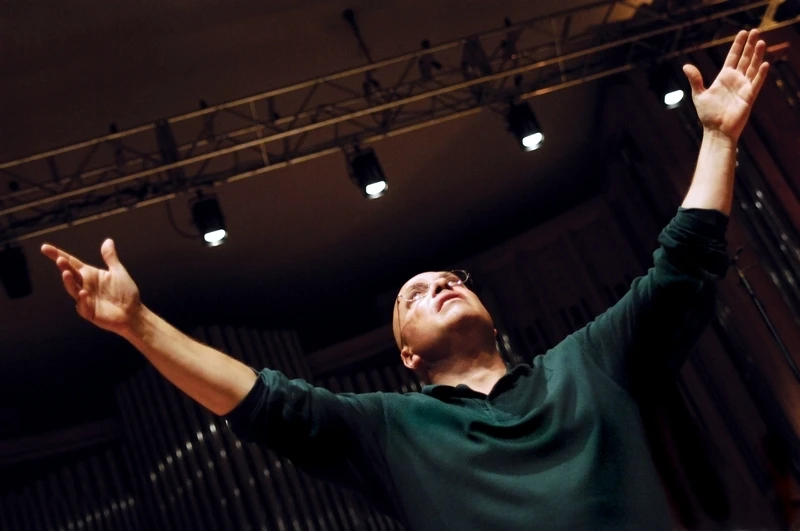Nestavím mezi žánry žádné hranice, hudba je přece univerzálním jazykem
V osobnosti zpěváka Marka Beasleyho se snoubí mnoho různých kvalit: jasný a podmanivý témbr hlasu, individuální vokální technika, která je výsledkem rozsáhlého samostudia a historického výzkumu, schopnost ponořit se do světa poezie a literatury – a přirozený komunikační talent. To vše se propojuje do jedinečného hudebního přístupu, v němž radost a rozmarnost zároveň dávají prostor elegickému a ojediněle intimnímu stylu. Od gregoriánského chorálu k polyfonii, od frottol k motetům šestnáctého století, od stylu recitar cantando ke slavným neapolským písním, až po novodobé rekonstrukce historických žánrů. Jeho výjimečné vokální a výrazové kvality spojené s osobní citlivostí a představivostí vedou k interpretacím, které jsou vždy nové. Marco Beasley se narodil v Neapoli v roce 1957. Během studia na univerzitě v Bologni, kde se soustředěně zabýval hudbou pozdní renesance a raného baroka, začal se souborem Accordone svou aktivní koncertní kariéru, která ho rychle zavedla na prestižní pódia – vystupoval v Mozarteu v Salcburku i Concertgebouw v Amsterdamu, v Accademii di Santa Cecilia v Římě i v Lincolnově centru v New Yorku.
Zpěvák Marco Beasley a cembalista Guido Morini výrazně obohatili dramaturgii festivalu Concentus Moraviae v minulých ročnících, ať už nesla podtitul „Baroko & jazz“, „Kouzlo čísel“ nebo „Italské slunce“. Tématem „Pojďme slavit!“ se festival letos vrací k nejzajímavějším interpretům dvou uplynulých festivalových dekád a Marco Beasley a Accordone nemohou chybět, tentokrát jako rezidenční hudebníci, kteří na Moravě stráví týden plný koncertů v různorodém obsazení. Marco Beasley však zároveň po třiceti letech bohatých na společné hudební zážitky soubor Accordone opouští a dvacetiletý festival Concentus Moraviae si symbolicky vybral jako místo rozloučení. A jako vždy, když se Marco Beasley a Accordone sejdou na jednom pódiu, to bude svátek pro potěchu srdce!
Soubor Accordone oslavil v loňském roce třicet let působení na poli staré hudby. S jakou motivací jste soubor se Stefanem Roccem a Guidem Morinim zakládal? V roce 1984 jsme se Stefanem studovali hudební fakultu univerzity v Bologni a seznámili se s Guidem, který už v té době budoval pozoruhodnou kariéru jako varhaník a hráč continua. Byli jsme hluboce zaujati „autentickou interpretací“ raného baroka. Denně jsme navštěvovali kurzy filologie, hudební paleografie, sémiologie, notace a historie, takže jsme se začali těmito mimořádně fascinujícími disciplinami soustředěně zabývat, a svět hudebního výrazu i citovosti se rozkládal před námi a čekal, až ho objevíme. To byl také okamžik vzniku Accordone a naše bádání v oblasti repertoáru, provozovací praxe a interpretace se až do dnešních dnů rozvíjí stále intenzivněji; vlastně také proto jsme se nedávno rozhodli pokračovat každý svou individuální cestou. Pořád je toho tolik k poznávání…
Ve svých vystoupeních rádi kombinujete konzervativní repertoár s folklorní i populární hudbou, a přestože mají vaše programy výraznou muzikologickou hodnotu, výsledkem je emotivní zážitek pro publikum. Po čem ve svých programech pátráte? Každý program koncipujeme jako příběh. Vypadá to jako něco samozřejmého, ale mnohé soubory prostě vedle sebe naskládají skladby, které často nesouvisí s tématem vytyčeným v podtitulu koncertu. Já naopak rád začínám z druhé strany, mým přáním je stvořit příběh, ve kterém hudba protíná hlavní téma, a využívám textů písní, aby příběh posluchačům vyprávěly. Věřím, že je verše osloví stejně mocně, jako zaujaly nás, když jsme je poprvé objevili. Další úrovní je potom vytvořit programy z našich vlastních děl. Kompozice Una Odissea, Una Iliade a Solve et Coagula jsou hudbou Guida Moriniho s mými texty. Vivifice, Spiritus Vitae, Vis a Passio vznikly na texty biblické. Všechny tyto projekty už jsme uvedli na pódia, mnohdy ve spolupráci s jinými soubory, jako jsou The Nederlands Blazers Ensemble nebo Hilliard Ensemble. Různé povahy tří zakládajících členů původního souboru Accordone vytvořily proměnlivý základ, na kterém vznikla řada různorodých programů. Mezi nimi nemám žádný, který bych měl raději než ostatní: pro mě je významné, že každý program je silným příběhem s jasnou identitou.
K repertoáru přistupujete po svém i v případě, že uvádíte známé skladby, váš zpěv je oproštěn od manýr a ozdob. Vzpomínám si, že jsem vás slyšela zpívat Wondrous machine Henryho Purcella, a ta skladba z vašich úst zněla, jako by byla zkomponovaná v 21. století. Jak přistupujete ke skladbě, kterou se chystáte nastudovat? Musím nejprve zdůraznit, že jsem nikdy nestudoval operní zpěv, a ke způsobu, jakým používám hlas, jsem došel svou zcela individuální studijní cestou. Nikdo nemůže tvrdit, že právě jeho interpretace je autentická. Nemáme žádnou nahrávku, která by dokumentovala, jakou hlasovou techniku používali pěvci v 17. století, ale v knihovnách je možno nalézt řadu pojednání a kronik, které mnohé naznačují. Dá se z nich například vyčíst, že zpěváci byli často označováni za „herce“, a velký důraz byl kladen na porozumění textu. Významné bylo také, nakolik ta či ona emoce vyjádřená na pódiu posluchače dovedla k pláči nebo ke smíchu. Zmínila jste Wondrous Machine: expresivita tohoto krásného úryvku z Ódy ke Dni sv. Cecílie je obsažena už v jeho názvu – úžasný stroj… Než se ponořím do celého textu, snažím se pocítit poselství a radost, které nesou už ona dvě slova spolu spojená.
Vaše poslední nahrávka pro label Alpha nese název Solve et Coagula (Rozpusť a smíchej) a je to opera, kterou zkomponoval Guido Morini na váš text. Je toto dílo vyvrcholením tří desítek let vaší umělecké spolupráce? A proč jste si vybrali takové vědecko-filozofické téma, jakým je život Raimonda di Sangro? Raimondo di Sangro, kníže ze Sansevera a vévoda z Torremaggiore, byl mimořádně silná osobnost, intelektuál žijící v Neapoli v 18. století během období nepokojů, které vyústily v neapolskou revoluci v roce 1799. Raimondo byl alchymista, vynálezce a především sběratel umění, filozof. Za své prostředky zrenovoval a vyzdobil rodinnou kapli Sansevero, nádhernou památku plnou mistrovských děl sochařského umění, z nichž každé je naplněno hlubokým významem. Zahalený Kristus, umístěný dnes ve středu kaple, je jednou z nejslavnějších soch symbolizujících lidské utrpení. Naši operu tedy inspiroval muž z Neapole, města kontrastů, které je nádherné a hrozivé zároveň, s Vesuvem, který se může v příští minutě probudit ze spánku a zpečetit osud každého, kdo se ocitl v jeho blízkosti. Chtěli jsme uctít památku muže, pro něhož bylo umění nejniternější potřebou, i genia loci mého rodného města. Zároveň je Solve et coagula jedním ze způsobů, jak oslavit třicet let existence souboru Accordone a naší spolupráce. Také v Accordone totiž funguje alchymie: naše harmonie má kořeny ve slově „přátelství“, a to v jeho nejniternějším významu.
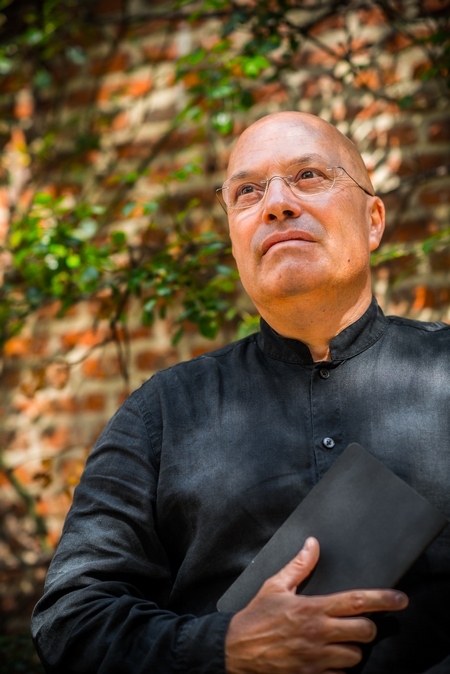 Můžete v této souvislosti představit Guida Moriniho jako hudebníka, skladatele, osobnost? Není jednoduché mluvit o příteli, kterého znám déle než 30 let. Jak bych mohl oddělit Guida člověka od Guida muzikanta? Je jedním z nejkompetentnějších, nejvzdělanějších a nejeklektičtějších instrumentalistů, jaké jsem slyšel hrát na klávesy, přemýšlivá osobnost s vášní pro astronomii, která ho provází životem. Jeho znalosti z oboru dějin harmonie a úžasné schopnosti na poli improvizace z něj dělají jedinečnou hudební osobnost. Je velmi diskrétní, výborný pozorovatel, posluchač, se kterým může být i ticho prostředím plným významů, citlivý muž se smyslem pro humor a někdo, s kým se dobře povídá. Guido je přítel.
Můžete v této souvislosti představit Guida Moriniho jako hudebníka, skladatele, osobnost? Není jednoduché mluvit o příteli, kterého znám déle než 30 let. Jak bych mohl oddělit Guida člověka od Guida muzikanta? Je jedním z nejkompetentnějších, nejvzdělanějších a nejeklektičtějších instrumentalistů, jaké jsem slyšel hrát na klávesy, přemýšlivá osobnost s vášní pro astronomii, která ho provází životem. Jeho znalosti z oboru dějin harmonie a úžasné schopnosti na poli improvizace z něj dělají jedinečnou hudební osobnost. Je velmi diskrétní, výborný pozorovatel, posluchač, se kterým může být i ticho prostředím plným významů, citlivý muž se smyslem pro humor a někdo, s kým se dobře povídá. Guido je přítel.
Vaše hudební cesty se nicméně rozcházejí, vy tíhnete k intimnějšímu výrazu a upřednostňujete blízký kontakt s posluchači. Jste přesycen velkými sály a monumentálním zvukem? Pohled z očí do očí byl pro můj způsob komunikace s publikem vždy příznačný a na tom se nic nemění. Po tolika aktivních letech, a je jich opravdu víc než tři desítky, bych rád pokračoval návratem k hudbě, která je mi velmi blízká: k loutnovým písním. Italská renesance, anglická renesance, Air de Cour… intimnější repertoár určený pro menší prostory. Přirozeně se cítím také ve svém aktuálním programu nazvaném Půlnoční vyprávění, ve kterém na pódiu stojím úplně sám: hlas se jednoduše nese prostorem, jako když se přátelé sejdou u krbu a starší vyprávějí těm nejmladším příběhy ze života.
Nemáte asi potřebu být zařazen do jedné kategorie, což vám přináší svobodu, na druhé straně váš osobitý přístup nemá jen obdivovatele, ale i kritiky. Je to tak, a je to tak myslím dobře. Není možné, aby se všem zamlouvalo, co dělám, a nevadí mi riskovat, že se můj výběr někomu nebude líbit. Nerad cítím odstup mezi jevištěm a hledištěm, nevyhovuje mi solipsismus umělce stojícího ve světle ramp, na kterého hledí celý svět. Naopak, čím menší je vzdálenost mezi mnou a diváky, tím jednodušeji se mi daří vtáhnout je do příběhu.
Pravidelně vystupujete v Holandsku, Belgii a Rakousku, z vašich koncertů se mohou těšit posluchači v Izraeli, Mexiku nebo Kanadě, ale v Itálii vystupujete jen zřídka, přestože vaším šálkem čaje jsou tradiční italské písně. Jak je to možné? Na tuhle otázku si sám nedokážu odpovědět. Od počátku mých aktivit bylo nesnadné najít příležitosti pro vystoupení v Itálii. Nikdy jsem nepochopil proč vlastně. Možná je to tím, že pořadatelé nejsou přesvědčeni o tom, že by „přirozený“ hlas, jaký mám já, měl zpívat starou hudbu. Lidé se mě pořád ptají, kdy budu víc slyšet v Itálii… Nevím.
Vaše jméno v programech většinou doprovází slovo „zpěv“. Vlastně mě překvapilo, že jste tenor, měla jsem dojem, že se pro vás nedá najít jednoznačné zařazení. Jaký tedy máte hlas? Vždy jsem se snažil uchovat svůj hlas v jeho nejpřirozenější možné barvě. Nestal jsem se operním zpěvákem, lákalo mě následovat doporučení dochovaná v historických materiálech z období, kterým se jako interpret věnuji. Pro můj hlas je tedy věřím příznačná osobitost, artikulace, dikce, rozsah (musím přiznat, že ten se s věkem trochu zmenšuje…). Takže mám „přirozeně vyškolený“ tenorový hlas, a když se lidé o typ mého hlasu zajímají, protože jsou při poslechu na pochybách, říkám prostě, že jsem tenor. V notových zápisech polyfonního repertoáru 16. a 17. století je tenor hlas, jehož part je zapsán na třetím řádku notového zápisu. Soprán, alt, tenor a bas byly v notách přiřazeny ke čtyřem živlům – vzduch, voda, země, oheň. Pokud jsou v notách další hlasy, mívají jiná označení: místo druhého sopránu je to quintus, druhý alt je označován jako sextus, a tak dále.
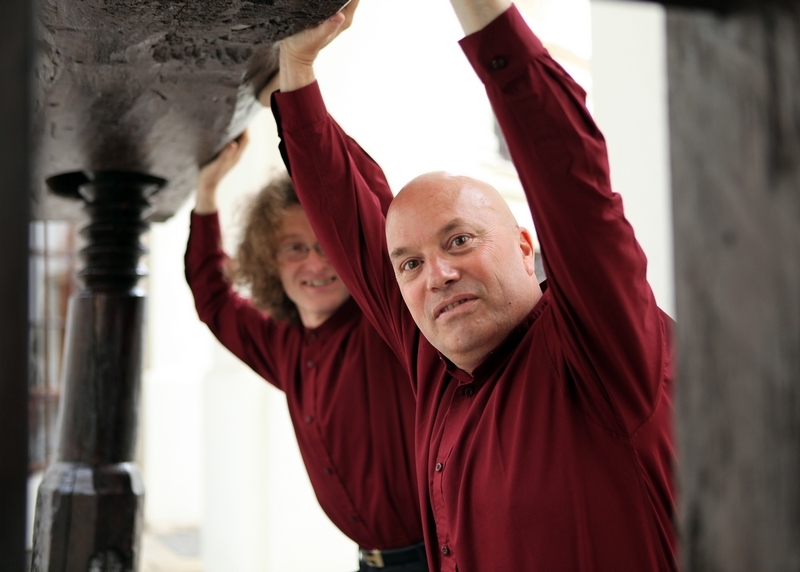
Vedle osobitého hlasového výrazu jsou významnou součástí vašich vystoupení gesta. V mé rodné Neapoli gesta umocňují slova a pro mě je přirozené přenést je na pódium. Gesta často vyjadřují víc než slova, mnohdy opravdu stačí místo slov pozvednout obočí nebo pohnout rukou. Ve stylu recitar cantando jsou gesta stejně důležitá jako zpěv. Pokud je nepoužíváte, nebo jimi plýtváte, riskujete, že váš projev nebude srozumitelný. Naopak úsporné gesto nebo výraz očí mohou říci mnohem více, pokud se propojí se zpěvem do fyziologické významové jednoty: gesta, slova, intonace, vše musí být provázáno. Vím, že to vypadá jako něco samozřejmého, ale není to tak snadné, věřte mi. Často žádám studenty svých kurzů, aby nahlas četli a vysvětlili význam slov, která se chystají zazpívat. A mnozí nejsou schopni text přečíst, správně recitovat verš, nebo dokonce ani vysvětlit, o čem text pojednává.
Zpěváci se s vámi mohou setkat 14. června na vašem workshopu „recitar cantando“ v kapli zámku Slavkov-Austerlitz. Co je čeká? Jak už jsem naznačil v minulé odpovědi, budeme se zabývat přednesem, významem textů, které budou chtít zpěváci studovat, a samozřejmě zpěvem. Workshopu se zúčastní také loutnista Stefano Rocco, mimořádně citlivý hudebník, který pomůže studentům pochopit, nakolik je důležitý dialog mezi hlasem a doprovodným nástrojem.
Na festivalu Concentus Moraviae jste s Guidem Morinim poprvé vystoupil v roce 2010 na pozvání dramaturga Václava Lukse a od té doby jste jako účinkující zavítal do řady zámku a kostelů regionu. Jaký je váš vztah k tomuto festivalu? Morava je opravdu nádherná země s bohatou historií a půvabnou krajinou. Koncerty festivalu Concentus Moraviae se konají v unikátních inspirativních prostorách a díky přátelskému publiku se na zámcích či v kostelích cítíme srdečně vítáni. Všechny tyto aspekty nahrávají tomu, aby zde umělci muzicírovali ve velmi uvolněném rozpoložení.
V červnu 2015 na Moravě vystoupíte počtvrté. Společně se souborem Accordone jste byl jmenován rezidenčním hudebníkem 20. ročníku festivalu Concentus Moraviae. Jak přispějete k letošnímu tématu „Pojďme slavit!“? Jsem velmi poctěn tím, že nám byla nabídnuta umělecká rezidence. Během celého týdne koncertování představíme řadu našich projektů: od duchovní hudby k tarantelám, od koncertu pro sólový hlas k instrumentálnímu večeru. Těšíme se, že se s festivalovým publikem podělíme o široké spektrum programů, které jsou zrcadlem toho, co jsme za třicet společných let vytvořili. Zároveň naznačíme nové cesty, které mě i soubor Accordone čekají. Il viaggio continua… (Cesta pokračuje…)
Kolika jazyky hovoříte? Váš otec byl Brit, ale jako dítě jste anglicky nemluvil, italština byla jediným jazykem, kterým se u vás doma v Neapoli komunikovalo. Proč tomu tak bylo? V šedesátých letech nebylo obvyklé hovořit mnoha jazyky. Můj otec, rodák z Coventry, nemohl mluvit anglicky ani v práci a musel se učit italsky, protože v Neapoli nikdo nemluví jiným jazykem než italštinou, nebo dokonce jen neapolštinou… Takže vlastně nebyl důvod anglicky mluvit. Angličtinou jsem se musel začít zabývat až mnohem později, když jsem začal kvůli koncertům cestovat po světě. Nemluvím perfektně, ale dorozumím se. Podobně je to s francouzštinou, řadu let jsem hodně působil ve Francii, takže jsem se potřeboval dorozumět. Nyní – kvůli mnoha koncertům v Belgii a Nizozemí – by bylo vhodné naučit se vlámsky, ale stárnu a jsem trochu lenivý, a lidé v těchto zemích všichni mluví anglicky! Pokud jde o češtinu, její zvuk se mi velmi líbí, ale obávám se, že se nedostanu dál než k pozdravu a poděkování.
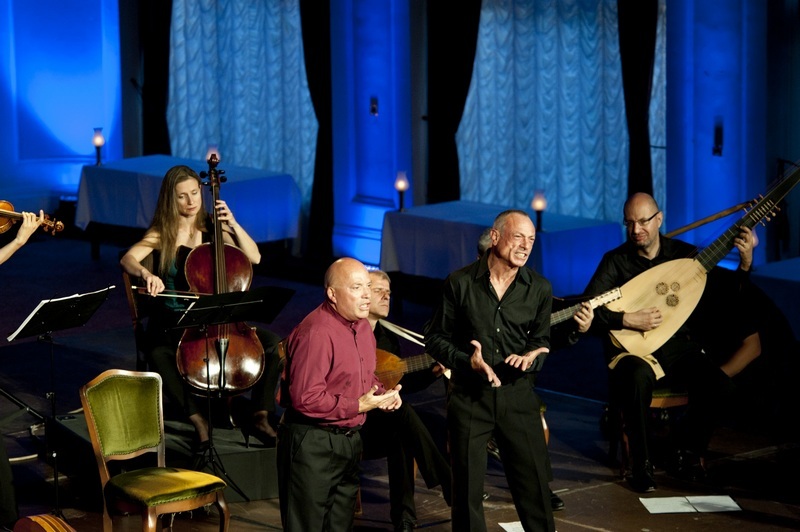
Jste dobrý plavec a žijete na pobřeží. Čím je pro vás moře? Narodil jsem se blízko moře a patří k mému životu. Dýchat solí prosycený vzduch, cítit přítomnost moře, pozorovat vlny, naslouchat zvukům bouře, to vše je pro mou duši nezbytností. A plavání mi pokaždé pomůže utřídit si myšlenky.
Máte tisíce přátel na facebooku a jste s nimi v aktivním kontaktu. Jste fanoušek online komunikace, je pro vás zpětná vazba fanoušků významná? Sociální sítě jsou dobré, dokud se příliš nevměšují do vašeho soukromého života. Pak se mohou stát nebezpečnými. Já jsem se ale narodil dávno před nástupem počítačů a necítím se jimi ohrožen… Jsem polichocen, když na mé posty fanoušci pozitivně reagují, ale facebook je pro mě spíš „pracovním nástrojem“ než skutečnou platformou pro sdílení zážitků. Osobní kontakt je pro mě vždy mnohem důležitější, než jakákoliv virtuální forma komunikace.
Vaše knihovna je plná knih o umění a historii, zároveň ale rád čtete paperbackové edice špionážních příběhů. Je pravda, že moje knihovna je pestrá, vedle klasických románů v ní můžete najít komiksy, technické příručky i umění… Zajímám se o řadu oblastí; moc rád například pracuji se dřevem, doma jsem si sám vyrobil jídelní stůl, dveře, kuchyň, postel i police na knihy. Na druhé straně se zabývám třeba kaligrafií, většina mých programů je napsána rukou. Rád se zabývám činnostmi, které vyžadují trpělivost.
Na vašich koncertech také můžeme slyšet v jednom večeru moteta i pijácké písně. Svým způsobem je tedy taková různorodost nebo paradox charakteristický i pro vaše vystoupení. Já ve svém přístupu k repertoáru žádný paradox nevidím. Nestavím mezi žánry žádné hranice, hudba je přece univerzálním jazykem. Snažím se udržet otevřenou mysl a zachovat si dětskou fantazii, byla by velká škoda vzdát se jí.
Marco Beasley & Accordone – přehled vystoupení v rámci festivalu Concentus Moraviae 2015: 8. června Státní hrad Pernštejn / Le Strade del Cuore, 9. června zámek Lednice / Estro Italiani, 10. června bazilika Třebíč / Cantate Deo, 11. června zámek Mikulov / Tarantelle del Piacere, 13. června zámek Slavkov – Austerlitz / Il Racconto di Mezzanotte, 14. června zámek Slavkov – Austerlitz / workshop Recitar Cantando.
(Autorka je spolupracovnice festivalu Concentus Moraviae. Výjimečně přinášíme rozhovor i pro zahraniční čtenáře v anglické verzi.)
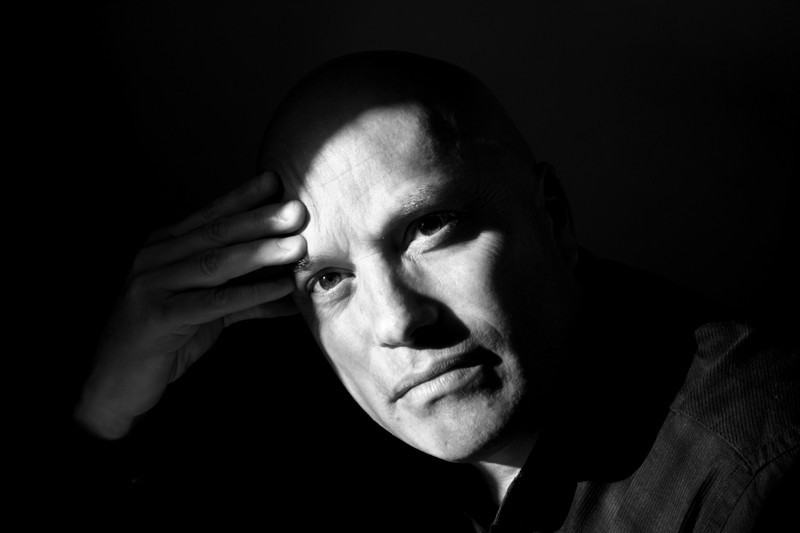
Il viaggio continua / The journey continues
The personality of the singer Marco Beasley embraces many different qualities: the clear and unmistakable purity of the timbre in his voice; a very particular vocal technique which is the result of extensive personal study and historical research; a love of the world of poetry and literature and a natural predisposition for communication. All of this results in a captivating musical approach in which joy and burlesque irreverence give way to a more elegiac and solitary style which is at once intimate and moving. From Gregorian chant to polyphony, from the sixteenth-century frottola to motets, from the recitar cantando to the great Neapolitan songs and on to modern re-inventions of historical genres: the exceptional qualities, both vocal and expressive, united with his personal sensibility and fantasy result in interpretations which are always new. Marco Beasley was born in Naples in 1957. During his musical studies at the University of Bologna, while deepening his knowledge of two stylistically pivotal points of the late Renaissance, he began an active concert career with the Accordone ensemble which quickly took him to some of the most prestigious venues in the world ranging from the Mozarteum in Salzburg to the Concertgebouw in Amsterdam, the Accademia di Santa Cecilia in Rome and the Lincoln Center in New York.
The singer Marco Beasley and the harpsichordist Guido Morini have significantly enriched the dramaturgy at the Concentus Moraviae Festival in previous years, no matter whether the theme was “Baroque & Jazz”, “Magic of Numbers” or “Italian Sun”. This year’s theme of “Let’s Celebrate!” will give the festival cause to return to some of the most interesting performers from its previous two decades and as such Marco Beasley and Accordone could not be overlooked. They will perform as resident musicians at this year’s festival and will spend a week performing various concerts in Moravia. However, Marco Beasley is also leaving the Accordone ensemble after thirty years of abundant shared musical experiences and he has symbolically chosen the twentieth Concentus Moraviae Festival as the place of farewell. And as always, when Marco Beasley and Accordone come together on one stage, it will be a festivity to stir the heart!
The Accordone ensemble celebrated 30 years of fruitful activities on the early music scene. What was your motivation when you founded the ensemble with Stefano Rocco and Guido Morini? It was in 1984 in Bologna. Stefano and I were students at the University’s Music Department and we met Guido, who already had a considerable and interesting career as an organist and continuo player. We were deeply interested in the „performance practice“ of the early baroque era: disciplines such as philology, musical palaeography, semiology, notation, history and so on were our daily courses, so we started with this repertoire because it was incredibly fascinating, a world of musical expression and feelings lay before us waiting to be discovered. Accordone was born in that moment and our research into this repertoire and its performance practice and interpretation is still developing even today based on our recent decision to take our further steps individually. There is still a lot to do…
In your performances, you like to combine a conservative repertoire with folklore and popular music and the result always provides listeners with strong emotional experiences, even if the programs have a meaningful musicological value. What do you look for in your programming? Each programme is conceived as a story itself. This seems obvious, but often it’s not like that; many groups make a sort of anthology of musical pieces that often have nothing to do with the theme expressed in the title. I like to do the opposite; I mean to create a story where the music crosses the main theme, using the words of the songs to „tell“ the story to the audience, to let them feel touched by the verses as the verses touched us when we were discovering them for the first time. Another step was to create a new repertoire by composing music and texts of our own. Una Odissea, Una Iliade and Solve et Coagula are compositions by Guido Morini set to my texts. He later also added Vivifice Spiritus Vitae Vis and Passio, both set to texts taken from the Holy Bible. These projects have been performed several times by Accordone or together with different groups, such as the Nederlands Blazers Ensemble or the Hilliard Ensemble.
The different personalities of the three members in the original Accordone Ensemble were the basic platform on which the multitude of stories described in the concert programmes were developed. So there is no one programme that I prefer more than another. What is important to me is to give each of them a clear identity.
Your approach even to the established repertoire is individual and fresh, your singing is free of frills and mannerism. I remember hearing you singing the Wondrous Machine by Henry Purcell and it sounded like a 21st century piece of music to me… How do you access a new piece of music that you intend to study? Firstly, I have to say that I didn’t study singing as an opera singer, so the way I use my voice is based on a different and quite personal type of vocal training. This training is basically the same, as the way of controlling the breath, but the sound is very different. No-one has the right to say that his own interpretation is the original or authentic one. We don’t have any audio documents showing how the voice was used in the 17th century, but many treatises and chronicles have survived and can be consulted in the libraries. And we can read that singers were often called „actors“ and how important the understanding of the texts was; or even how much this or that feeling expressed on stage moved the audience to cry or laugh. You were talking about the Wondrous Machine: the expressivity of this beautiful extract from the Ode to Saint Cecilia’s Day is contained in its title. How can I approach these texts, if I don’t feel the message and the pleasure contained in these two words at the very beginning?
Your latest CD recording for Alpha is entitled Solve et Coagula and it is an opera set to your libretto with music by Guido Morini. Why did you take the inventor and philosopher Raimondo di Sangro as your inspiration? Raimondo di Sangro Principe di Sansevero e Duca di Torremaggiore was an intellectual with a high personality who lived in Naples in the 18th century also during the intellectual ferment which culminated in the Neapolitan Revolution of 1799. Raimondo was an alchemist, an inventor and a collector of art at its highest point. However, he was also a philosopher too, as a military graduate. He used his own money to restore and enrich the family chapel in Naples, the Sansevero Chapel, a wonderful monument full of sculptured masterpieces, each of them pregnant with different and deepest meanings. The Veiled Christ, now situated in the middle of the Chapel, is one of the most famous sculptures ever made as a symbol of the suffering of humanity. He lived in Naples, a town of contrasts, both beautiful and terrible at the same time, with Vesuvius, the sleeping volcano that can decide the fate of everyone around at any second of our existence. So our opera is a tribute to this man and his need to feel the arts, as well as to the genius loci of my native town. At the same time Solve et Coagula is our way of celebrating thirty years of the existence of Accordone and our cooperation. There is an alchemy in Accordone too: its harmony has its roots in the word „friendship“ according to its deepest meaning.
Can you introduce Guido Morini as a musician, a composer and a person in this context? It is difficult to talk about a friend whom you have known for more than thirty years: how I can separate Guido the man from Guido the musician? He is one of the most competent, well-trained and eclectic instrumentalists that I have ever heard on keyboards, a thoughtful personality, his passion for astronomy is a guiding feature of his life, his knowledge of the history of harmony and his great ability in the art of improvisation have put him at the top of his profession. A very discrete personality, an observer, a listener who takes silence as a place full of meaning; a man with a hidden sensibility full of a good sense of humour and someone who is good to talk to. Guido is a friend.
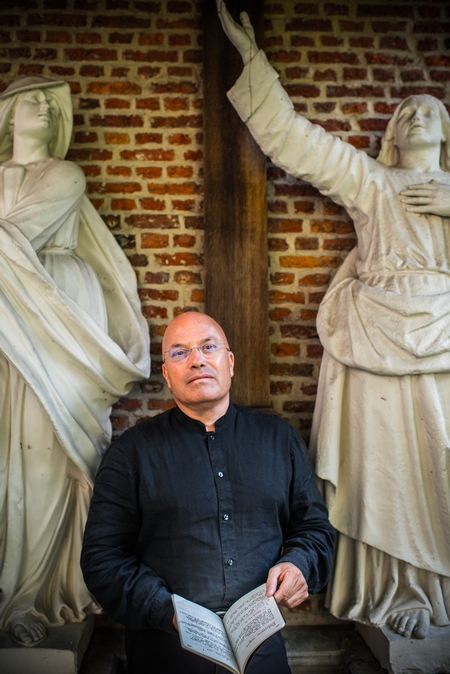 However, your musical journeys are about to separate. You tend to prefer a more intimate means of expression and direct eye-to-eye contact with your audience. Are you fed up with large venues and a monumental sound? Well, „direct eye contact“ with the audience has always been peculiar to my way of performing and it will not change in the future, I hope. After so many years of activity – more than thirty actually – I would like to go forward, but with a look back to the music I love so much: the lute songs. The Italian renaissance, the English renaissance, the Air de Cour… a more intimate repertoire, perhaps for more intimate spaces. And I would like to continue performing my current programme called Il Racconto di Mezzanotte, in which I am totally alone on stage: a solo voice flows in the air to tell stories to each of us, one by one, as the elders used to tell stories to the youngest around a fire a long time ago…
However, your musical journeys are about to separate. You tend to prefer a more intimate means of expression and direct eye-to-eye contact with your audience. Are you fed up with large venues and a monumental sound? Well, „direct eye contact“ with the audience has always been peculiar to my way of performing and it will not change in the future, I hope. After so many years of activity – more than thirty actually – I would like to go forward, but with a look back to the music I love so much: the lute songs. The Italian renaissance, the English renaissance, the Air de Cour… a more intimate repertoire, perhaps for more intimate spaces. And I would like to continue performing my current programme called Il Racconto di Mezzanotte, in which I am totally alone on stage: a solo voice flows in the air to tell stories to each of us, one by one, as the elders used to tell stories to the youngest around a fire a long time ago…
You do not need to be categorised, which on the one hand gives you a lot of freedom in your activities, but on the other hand you also come up against critics as well as admirers and your attitude is not generally accepted. Yes and this is good, I guess. It would be impossible for everyone to like what I do. Anyway I always prefer to take the risk that someone will not agree with my choice. I don’t like a distance between the stage and the audience, the solipsism of the artist in front of the whole world around him. On the contrary, I prefer less distance between me on the stage and the audience also in term of meters, so they can ideally take better part in the performance…
You have had many concerts in Holland, Belgium and Austria and audiences in Israel, Mexico or Canada have enjoyed your performances, but you do not perform very frequently in Italy, even though traditional Italian songs are your forte. Why is that? This is a question that has always remained unanswered for me. Since the very beginning of my activities, it has always been very difficult to find concerts in Italy. I have never understood why. I guess that one of the reasons could be that the organizers haven’t dared trust a „natural“ voice like mine which sings the early repertoire. This is despite the numbers of people who have asked me to perform more in Italy… that’s life.
The simple word “voice” or “singing” usually accompanies your name in printed programs, I was actually surprised that you are a tenor as I thought your singing was impossible to range. What is your voice like? I have always tried to preserve my voice in the most natural timbre possible. It was and still is interesting to study and train, because I have chosen not to become a traditional opera singer, but I always wanted to work in accordance with the advice of the preserved treatises from the period of the repertoire I’m devoted to. The peculiarity of the voice I have developed lies in its recognisability, articulation, diction and range (well, with age it has become a bit less, I have to admit…). So I have developed a „naturally trained“ tenor voice that has led many people to doubt what they are listening to… When people ask about my voice, I generally say it is a „tenor“ voice. Looking at the polyphonic repertoire of the 16th and 17th centuries, the range of the voice written on the third line of the scores is called tenor. The voices in the scores were related to the four elements (air, water, earth, fire), hence soprano, alto, tenor and bass. If there are any other voices in the score, they are usually given other names: there is no second soprano, but a quintus, and a second alto becomes a sextus and so on.
As well as your individual vocal expression, gestures are also an important part of your performance. We always use gestures as a code to emphasize words in Naples, so it’s quite natural for me to use them on stage. Many times, gestures express more than words: we don’t need to say anything, but merely to use an eyebrow or turn a hand. In the Recitar Cantando style, gestures are as important as singing: without a gesture or with too many of them you take the risk of not being understandable. Instead, a small gesture, a glance, can tell us so much more, if the singing also follows it with a physiological unity of „meaning“: gestures, words and intonation all together. It looks obvious, I know, but it is not so easy to feel, believe me. Many times, I have asked the students at my masterclasses to read in the voice and to explain the texts they are about to sing. And many times they have not been able to read it, to follow the verses or – what’s worst – to tell us what the text is about…
Singers can meet you at your Recitar Cantando workshop at the château chapel in Austerlitz on June 14th. What should they expect? In some ways I have already answered this in the previous question. Reading, talking about the meaning of the texts they will present to us and of course singing them. The presence of Stefano Rocco with his lute and theorbo and his competence in this area will help a lot of the students to understand the necessary dialogue between the voice and the continuo parts.
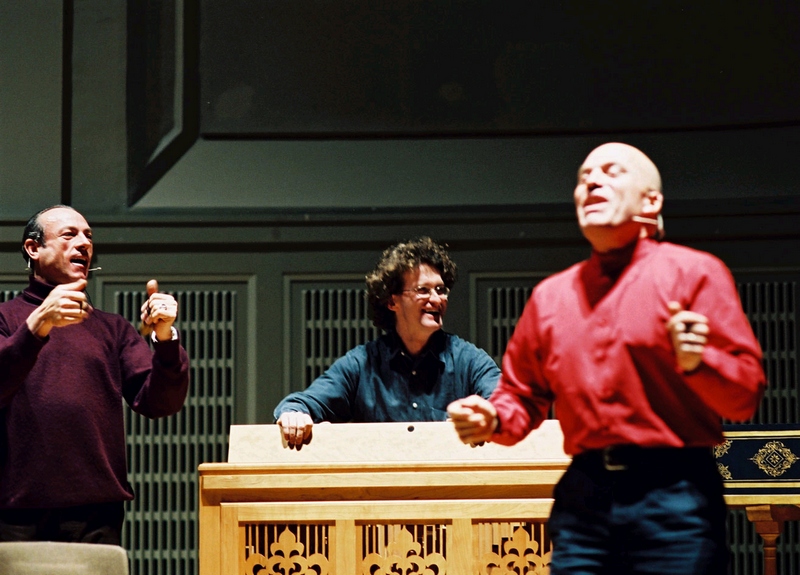
You attended the Concentus Moraviae Festival for the first time in 2010 at the invitation of the dramaturge Václav Luks and you have visited several châteaux and churches in the region as performer since then. What is your relationship to this event? Moravia is beautiful, a place full of history and a beautiful countryside. The Concentus Moraviae Festival is held in some unique venues, where the warmth of the audience lets us feel comfortable in concert venues, such as castles, churches, beautiful manors and parks. These all combine to give to the performer a beautiful ambience, where it is comfortable to play music in a very welcome atmosphere.
In June 2015, you will return to Moravia to participate in the Concentus Moraviae for the fourth time. The festival will celebrate 20 years and you and the Accordone ensemble have been appointed Artists in Residence. What will your contribution to the festival’s jubilee year subtitled “Let´s celebrate!” be? I’m very honoured that the Concentus Moraviae has asked me and Accordone to be the artists in residence. We will perform more or less a week of concerts with some of our projects. From sacred music to tarantellas, from solo voice to an instrumental ensemble: a large spectrum of the activities which we have shared during our thirty years together. But also some new ideas that will show a new path for the group and me. Il viaggio continua…
How many languages do you speak? Your father was British, but you did not speak English when you were a child. Italian was the only language in your home in Napoli. Why was that? During the sixties, it was not the habit to speak many languages: my father, a native of Coventry, spoke English at work and had to learn Italian because nobody in Naples spoke any other language than Italian or even Neapolitan… so it was not the main point to learn English. I did that much later, when I started travelling because of the concerts worldwide. I didn’t learn it very well, but enough to be understood. It is the same thing with French: I worked in France quite a lot for a few years, so I learnt that language too. Now, it would be good to learn Flemish due to my many concerts in Belgium and the Netherlands, but I’m getting older and lazy… and the people in those countries speak English so well! And, I like the sound of the Czech language, but I am afraid I will not get any further than saying hello and thank you.
You are a good swimmer and all your life you have lived by the seaside. What does the sea mean to you? I was born very close to the sea and it has always been part of my life. I live quite close to the sea now and breathing its air, feeling its presence, looking at the waves, listening to the tempest is necessary for my soul. Swimming has always been a way for me to collect my thoughts.
You have thousands of friends on Facebook and are in active contact with them. Are you a fan of online communications, is the feedback from your fans important for you? Social networks are good as long as they don’t enter my private life too much. This can be dangerous, but as I was born long before the computer era I feel safe… I always feel flattered to read a good reaction to some posts, but to me it is more a „working instrument“ than a real platform for sharing experiences. Personal contact is always much better than any virtual means of communication.
Your private library is full of historical and art books as well as contemporary novels. However, at the same time you also enjoy reading paperback spy stories. It’s true that I have a very eclectic library at home: on my bookshelf, you can find many classical romances and comics, technical books and art… and I am interested in different disciplines; for example, I love making wooden furniture and writing texts. I made my dining table, the doors, the kitchen, my bed and all the bookshelves at home. On the other hand, I also like calligraphy and most of my programmes are handwritten. It’s a question of time: I like to take the time to do things.
In your concerts, we can also hear motets and drinking songs during a single evening. Somehow, this diversity or “paradox” seems to be characteristic also for your performances. I do not see any paradox in such an approach to the repertoire. Music is a universal language and it would be a pity to become locked in a box voluntarily. I try to keep my mind open and to preserve the fantasy and dreams of a child. It would be a pity to give them up.
